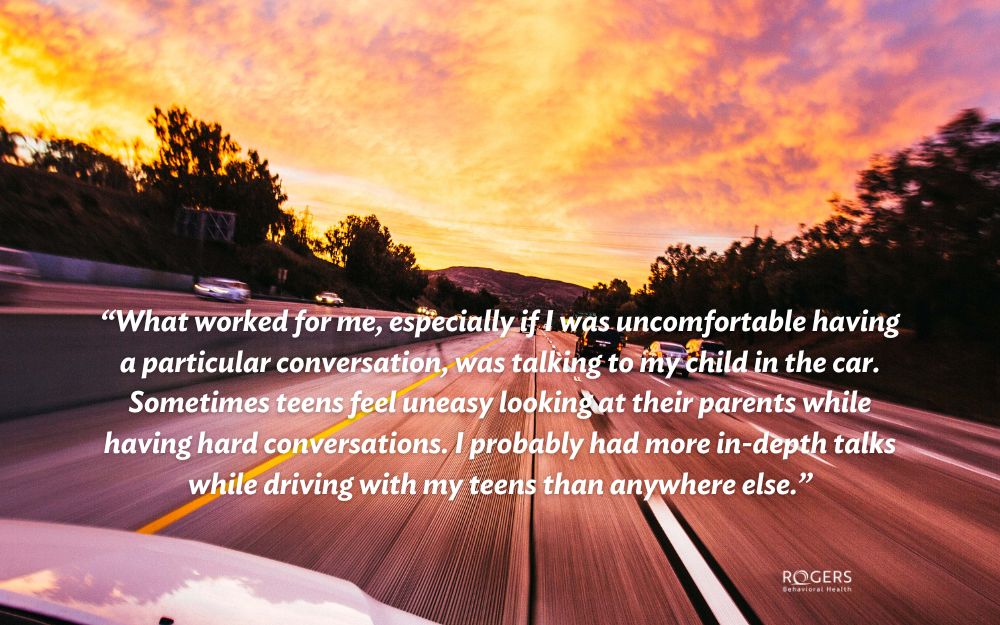A recent CDC report is raising concern about teens and their mental health, saying rising levels of depression and anxiety are why they’re turning to substances like alcohol and drugs.
Among adolescents assessed for substance use disorder treatment, the most commonly reported reasons they use substances are:
- to feel mellow, calm, or relaxed
- to stop worrying about a problem, or to forget bad memories
- to help with depression or anxiety
“I think as a society, we’re focused on feeling good and easy fixes,” says Michelle Maloney, PhD, LPC, CAADC, CRPS, executive clinical director of Rogers’ Mental Health and Addiction Recovery Services. “We’re inundated with pharmaceutical and alcohol ads. Just look at how many aired during the Super Bowl.”
Dr. Maloney says while ads don’t promote substance use disorder, they affect impressionable adolescents.
“They can begin to think using substances is part of our social norms,” she explains. “It’s important to remember that about 90% of the people we see in treatment started their substance use in adolescence.”
While experimenting in adolescence is not abnormal, she says some substances are problematic right from the start.
“There is no such thing as experimentation with fentanyl, or using IV substances,” she explains.
Conversations with teens about substances like alcohol and drugs
While parents and caregivers can sometimes feel helpless against the pressures and messages teens face, Dr. Maloney says having conversations early and often is critical.
“Talk with your children about making choices,” she says. “Use events in the news to start a conversation. Discuss having an exit plan, so if your child is somewhere substances are being used, they can call or text you, using an agreed-upon code word, and they know you will get them and ask questions later. What worked for me, especially if I was uncomfortable having a particular conversation, was talking to my child in the car. Sometimes teens feel uneasy looking at their parents while having hard conversations. I probably had more in-depth talks while driving with my teens than anywhere else.”
If you think your child is using substances, Dr. Maloney says to ask yourself the following questions:
- Are their grades dropping?
- Did their friend group change?
- Have their sleeping habits changed?
- Are they withdrawing from family and their usual activities?
With overdose being the leading cause of death for people ages 18 to 45, she cautions people to not wait to ask for help.
“If your gut is telling you something is wrong, talk with your child’s primary care provider or a mental health professional,” she says. “Don’t let stigma get in the way of getting help for your child if needed.”
Combating teen stress
With nearly 75% of teens surveyed saying they used substances to ease stress, Dr. Peggy Scallon says adolescents are feeling a of uncertainty in that season of life.
“They’re wondering if they’re going to measure up, and whether they’re prepared for what’s next,” says Dr. Scallon, MD, DFAPA, DFAACAP, psychiatrist and medical director, Focus Depression Recovery Adolescent Residential Care. “It’s common for adolescents to compare themselves to other people, whether it’s an ACT score, their popularity, or their own achievements, in school or otherwise. As adults, we usually don’t have those direct comparisons because we have differentiated ourselves and have our own lives. Kids are all together without having pursued their own paths, so they feel anxious about how they’re measuring up. They want to feel that they’re good enough.”
Dr. Scallon says the use of screens has changed the face of childhood.
“It edges out homework, jobs, and other healthy activities,” she explains. “Kids end up feeling restless and anxious.”
Dr, Scallon says there are many healthy ways parents and caregivers can encourage teens to reduce their stress:
- Physically move every day. Kids are very sedentary, so being physically active helps a lot.
- Get outdoors.
- Engage in face-to-face socialization, which is not the same as screen contact.
- Contribute to something bigger than themselves. Having a purpose or a meaning beyond their own experience is helpful.
- Have responsibilities at home or in the community.
- Pursue interests, like sports, music, or art.
- Develop skills toward becoming an adult, like getting a part-time job and a driver’s license. It’s helpful for kids to develop readiness for being an adult because typically teens have a lot of anxiety about their future.
- Maintain a schedule. Being able to fit everything in helps a person to feel good about themselves.
How Rogers can help with teen substance use
If your teen is struggling with their mental health, Rogers has teams of experienced and compassionate experts ready to help. Call 800-767-4411 for a free, confidential screening.


